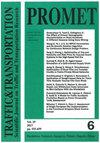Optimization of the Suburban Railway Train Operation Plan Based on the Zonal Mode
IF 1.1
4区 工程技术
Q4 TRANSPORTATION SCIENCE & TECHNOLOGY
引用次数: 1
Abstract
Traditional all-stop train operation mode cannot meet the demand of long travel distance and centralized travel of commuters very well. To meet this special travel demand, a zonal train operation mode based on “many-to-many” train stops is proposed. The coefficient of passenger exchange is used to locate suburban areas by depicting travel characteristics of commuters. Operational separating points within the suburban area are used as decision variables to analyze the combined cost components of this model, including passenger travel costs and railway operating costs. An integer programming model with the lowest overall cost is established, and the genetic algorithm is employed to solve it. The results proved good relative benefits in operation costs and travel time. And the sensitivity analysis of both coefficient of passenger exchange and passenger intensity has shown that the zonal operation mode is suitable for suburban railways with centralized travelers. However, the research also shows that when the passenger volume rose to a very high level, the number of zones would be limited by the maximized capacity of railway lines, which may cause the decline of the relative operational efficiency.基于分区模式的城郊铁路列车运行计划优化
传统的全站式列车运营模式已不能很好地满足通勤者长距离出行和集中出行的需求。针对这种特殊的出行需求,提出了一种基于“多对多”站点的区域列车运行模式。乘客交换系数通过描述通勤者的出行特征来定位郊区。以城郊运营分离点为决策变量,分析该模型的综合成本构成,包括旅客出行成本和铁路运营成本。建立了总体成本最低的整数规划模型,并采用遗传算法求解。结果表明,在运行成本和行程时间方面具有较好的相对效益。客运交换系数和客运强度的敏感性分析表明,分区运营模式适合于旅客集中的城郊铁路。然而,研究也表明,当客运量上升到非常高的水平时,区域数量将受到铁路线路最大运力的限制,这可能导致相对运营效率的下降。
本文章由计算机程序翻译,如有差异,请以英文原文为准。
求助全文
约1分钟内获得全文
求助全文
来源期刊

Promet-Traffic & Transportation
工程技术-运输科技
CiteScore
1.90
自引率
20.00%
发文量
62
审稿时长
3 months
期刊介绍:
This scientific journal publishes scientific papers in the area of technical sciences, field of transport and traffic technology.
The basic guidelines of the journal, which support the mission - promotion of transport science, are: relevancy of published papers and reviewer competency, established identity in the print and publishing profile, as well as other formal and informal details. The journal organisation consists of the Editorial Board, Editors, Reviewer Selection Committee and the Scientific Advisory Committee.
The received papers are subject to peer review in accordance with the recommendations for international scientific journals.
The papers published in the journal are placed in sections which explain their focus in more detail. The sections are: transportation economy, information and communication technology, intelligent transport systems, human-transport interaction, intermodal transport, education in traffic and transport, traffic planning, traffic and environment (ecology), traffic on motorways, traffic in the cities, transport and sustainable development, traffic and space, traffic infrastructure, traffic policy, transport engineering, transport law, safety and security in traffic, transport logistics, transport technology, transport telematics, internal transport, traffic management, science in traffic and transport, traffic engineering, transport in emergency situations, swarm intelligence in transportation engineering.
The Journal also publishes information not subject to review, and classified under the following headings: book and other reviews, symposia, conferences and exhibitions, scientific cooperation, anniversaries, portraits, bibliographies, publisher information, news, etc.
 求助内容:
求助内容: 应助结果提醒方式:
应助结果提醒方式:


